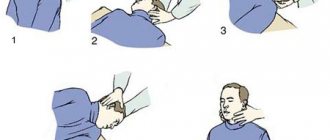Psyche and immunity
The term "psychoimmunology" was coined in 1964 by George Solomon to refer to the relationship between emotions, immunity and disease. Robert Adler from the University of Rochester expanded this concept in 1975, and now doctors use the term “psychoneuroimmunology,” which more fully reveals the meaning of the mutual influence of mental state and physical health.
In recent years, this area has been developing rapidly, and even non-professionals should keep abreast of the main discoveries.
What is this immunity anyway?
Let me briefly remind you that immunity is the body’s ability to protect itself from foreign objects. The biological meaning of immunity is to preserve the genetic integrity of the body. The so-called immune system consists of a central part: the red bone marrow and thymus - and a peripheral part: the spleen and lymph nodes.
You may have noticed that when you have a boil, the nearby lymph nodes increase in size. This happens as they build up strength to protect you. It is not surprising that doctors pay so much attention to the lymph nodes, feeling them during a medical examination.
Special cells—lymphocytes—play an important role in the body’s immune response. At the cellular level, T-lymphocytes work (they mainly destroy and break down damaged cells), and the humoral response (production of antibodies in the blood) is provided by B-lymphocytes. There are many other protective cells, especially the “cool” ones are called “natural killers”; they are able to effectively attack tumor cells.
How do psychological factors affect the immune system?
Most often, this influence is exerted through the endocrine system. Increased nervous tension leads to the release of catecholamines and cortisol, which ultimately reduces the activity of the immune system.
By the way, doctors use synthetic analogues of catecholamines and cortisol to treat allergic reactions and so-called autoimmune diseases (when the immune system “goes crazy” and attacks its own cells).
And other mechanisms of influence of the human psyche on the immune system remain to be studied. For example, it is still not clear why a person who looks at wallpaper with strawberries has a severe allergic reaction, as if he had actually eaten a certain amount of these berries (we are, of course, talking about a person who has previously allergic reactions to strawberries have been reported).
Acute and chronic stress suppresses the immune system
The easiest way to study the effects of stress on the body was to study medical students, since they, like any students, experience exam stress with a certain frequency and are very responsible for medical and biological research.
Thus, the immune response was tested during three-time vaccination against hepatitis B. The production of antibodies to hepatitis B occurred only in those students who did not experience exam stress. Those who experienced even moderate levels of anxiety did not produce the necessary immune response. That is, vaccination was useless for them. And note, we are talking about completely healthy young people. And the stress was not the greatest.
The same was observed regarding the healing of superficial wounds during examinations. The process was on average 40% slower than during the summer holidays.
Not only exams, but also other seemingly ordinary things can suppress your immune system. A fairly common example of chronic stress occurs in family caregivers. God forbid you have a family member with Alzheimer's. Here your defenses will definitely be depleted, and everything that the restless students experienced during the session will manifest itself with particular force.
Why does the immune system weaken?
We have heard more than once that a strong immune system will protect us from viruses and colds and will help in the fight against serious diseases. Why is it strong for some people and weak for others? Is it possible to “control” immunity? We talked about this with an allergist-immunologist, pediatrician at the TANAR Family Clinic, Candidate of Medical Sciences - Irina Solovyova.
— Irina Nikolaevna, we are often accustomed to blaming poor immunity for all our illnesses, but is this true? Do all diseases come from problems with the immune system?
— In many diseases, especially infectious ones, the immune system is involved in the process. The immune system is a collection of cells and organs in the human body that provides us with immediate protection against foreign substances. If a person gets sick, this does not mean that the immune system has weakened. The disease itself is the body’s struggle; the immune system does not allow viruses and bacteria to live in human cells and tissues. And people must get sick, the cells of the immune system must work, otherwise they begin to work in a different direction, for example: allergies develop, familiar substances (milk, egg, wheat, birch) are perceived by the immune system as foreign and inflammation occurs against them. There is a hygiene theory of allergies. Scientific research has proven that children who live in “sterile conditions”, in isolation, without pets, whom their parents protect from viral infections, are not taken anywhere if they have not had contact with helminths (worms) or parasites (giardia) in their lives. , suffers from allergies more often. The immune system, like any organ, must work, otherwise allergies, oncology, autoimmune processes will atrophy or work in a different direction (when antibodies are formed against themselves, for example, urticaria, glomerulonephritis - inflammation of the kidneys, thyroiditis - inflammation of the thyroid gland). Therefore, there is no need to be afraid that children get sick and put everything in their mouths - they are training their immune system.
— Are they born with good immunity or is it “developed” in some way?
— Immunity can be natural, congenital (inherited by the child from the mother) or acquired (appears after an infection). In addition, there is artificial immunity - active (appears after vaccination) and passive immunity appears after a therapeutic serum (this is when ready-made antibodies are injected into a person who has had contact, for example, bitten by a fox or a dog, and anti-rabies serum is injected). If a pregnant woman is vaccinated against influenza, then from the 13th week of intrauterine development the child will develop antibodies that protect him from this strain of the virus for up to three years.
— The expression “weakened immunity” is quite common. Please explain it from a medical point of view.
— We are used to talking about weakened immunity when people begin to get sick often. But a simple acute respiratory infection or ARVI does not mean that the immune system has weakened. If a person gets sick three or four times a year, especially in a large industrial city, this is normal. Another thing is if the infection worsens, the person begins to get sick often, for a long time, the infection goes deeper, tonsillitis, otitis, stomatitis, bronchitis or pneumonia often occur. If the infection in the kidney or bladder recurs too often, herpes, boils, acne, fungal infection (candidiasis in women) appear - one of the reasons for this may be reduced immunity, that is, the cells of the immune system cannot fully illuminate the infectious agent and it causes inflammation. Such patients require comprehensive examination and treatment.
— Why does immunity decrease?
- A person can be born with a congenital defect of the immune system - this is when a number of cells of the immune system are missing or they do not produce certain substances. And the first marker is the reaction to the vaccine: complications arise from vaccination, what parents are so afraid of and why they refuse. In fact, the vaccine allows for timely diagnosis of congenital immunodeficiency. A healthy person does not develop the disease in response to the vaccine. Secondary immunodeficiencies occur during life. Acute and chronic stress, ionizing radiation, surgical treatment, and chemotherapy in the treatment of cancer patients can lead to a decrease in immunity. Smoking is a risk factor for the development of immune system disorders. Smokers - and especially their children - are much more likely to suffer acute respiratory infections of various etiologies.
— How can you find out what state the immune system is in?
— To begin with, you can simply collect an anamnesis (ask the patient: how often and what diseases does the person suffer from).
If there is a suspicion of immunodeficiency, an immunological examination is carried out
— In what cases does the doctor ask for an immunogram? Is it worth carrying out this blood test for preventive purposes?
— An immunogram is a study that can be used to determine the presence or absence of immunodeficiency. This is an expensive test, but if there are warning signs, it is worth doing it
— How to boost immunity during cold season?
— It is advisable not to increase immunity, but to strengthen it. To do this, you should lead a healthy lifestyle. Follow a sleep and rest schedule, eat right and exercise. Stress, overexertion, and low physical activity can become one of the causes of diseases. Protein foods are one of the sources of supporting immunity. A person’s diet must include porridge, meat, cottage cheese, milk, and fish. It is advisable to fortify food: add ginger, lemon, rose hips, seasonings cinnamon, turmeric, cloves, if there are no contraindications. Inflammatory diseases of the digestive system lead to impaired absorption of vitamins and microelements even with sufficient consumption, which is why anti-relapse treatment of the gastrointestinal tract is carried out in February. Self-massage of biologically active points is effective. Gymnastics for the throat. But hardening procedures, if you have not started hardening earlier, should not be started during the epidemic season. It is important to ventilate the premises and disinfect them using ultraviolet irradiators, desars, ozonizers, and salt lamps. If you are not allergic, you can use aromatherapy. Before going outside or into a public place, filter masks that capture viruses and bacteria or barrier sprays are most effective. Wash your hands often. It is good to increase the duration of sleep by 1.5 - 2 hours. If possible, take a nap during the day. Immunoprophylaxis - vaccination against influenza, pneumococcal and Haemophilus influenzae infections - remains the most effective method of preventing the disease. If you didn’t have time, then during the epidemic season you can carry out “microvaccination” using bacterial lysates, for example bronchovacone, in combination with riofloraimmune, multivitamins with microelements.
Interviewed by Arina Lavrova
Stress and immunity: where is the connection?
02/09/2021 Our immune system protects the body from foreign proteins, bacteria and viruses with the help of lymphocytes - the main immune cells that have various functions.
These cells move inside our body through lymphatic and blood vessels, and can also be concentrated in the organs of the immune system:
- thymus;
- bone marrow;
- spleen.
Each of these organs is innervated, that is, it is capable of exchanging information with the nervous system and changing the activity of the response to foreign bodies under the influence of various stimuli.
Some scientists call our immune system a sensory organ or “sixth sense” because of its ability to perceive certain signals coming from foreign proteins.
| The intensity of these signals is regulated by our brain, and stress plays an important role in this process. |
How does stress affect immune system function?
There are two types of stress: the first activates protective functions, the second suppresses them. Let's imagine that you have been exposed to a mild stressor. For example, we saw a loved one (joy is also stress). Such a short-term and relatively weak stressor temporarily activates the functions of the immune system:
- more antibodies are formed;
- the process of reproduction of cells of the immune system is stimulated, etc.
However, with severe stress (distress) associated with negative events, the opposite picture is observed. The significance of the stressful event and personal characteristics play an important role - everyone has a different stress threshold, resistance to it and behavioral strategies.
The response to stress is realized by the nervous and endocrine systems. In particular, the hormone cortisol is released. It has always been believed that high levels of it suppress the immune system.
But recently, scientists have obtained experimental data refuting this hypothesis. In fact, when distress occurs, the functional interaction between the nervous and immune systems is disrupted. This leads to the development of chronic fatigue syndrome - a disease in which a person constantly feels weak, often gets sick and gets tired quickly.
The best way to combat this effect is to reduce distress. Try to soften your reaction with the help of psychotherapy and reduce the negative consequences for the immune system - taking vitamins and microelements, the deficiency of which can cause chronic fatigue.
Read our Facebook to stay up to date with the latest events.
Was the information useful?







